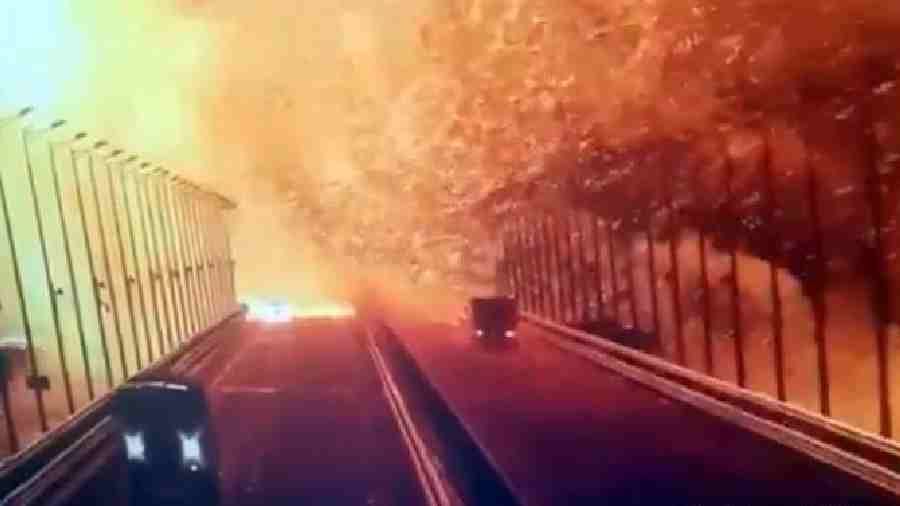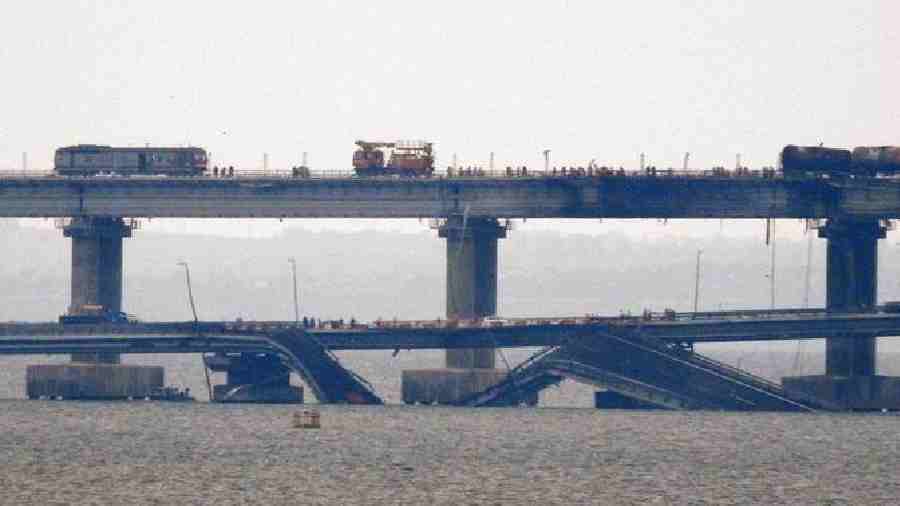An explosion damaged the Kerch Bridge earlier this week. The bridge connects Russia with the city of Kerch in Crimea, which was illegally annexed by Russia in 2014. Images and videos of the blast have been going viral since then. But some of these are old or manipulated, even fooling media organizations. DW takes a closer look.
A truck with disappearing wheels?
Some reports purport to show the perpetrators of the Crimea bridge explosion, which Russia has classified as a terrorist attack. Investigators with Russia's domestic intelligence agency, the Federal Security Service (FSB) claim Ukraine's military intelligence agency, known as HUR, is responsible for the blast and provided what they allege is proof: a suspicious truck.
Claim: "A video shows the inspection of a truck carrying an explosive device,” Russian news agency, RIA Novosti reported, citing the FSB intelligence agency. An X-ray image of the truck is said to show its explosive cargo.
Verdict: False.
The truck in the X-ray photo isn't identical with the truck in the video widely accepted as showing the vehicle responsible for the blast. This difference is obvious if you compare a screenshot from the video alongside the X-ray image (shown below). The video which is allegedly surveillance footage, shows the search of a truck at a customs post in Taman, Russia. The image, according to Russian media citing the FSB, is allegedly an X-ray of the truck carrying the explosives hidden among pallets loaded with rolls of film.
The most striking discrepancy between the two vehicles is the different number of wheels, or axles. In the X-ray image, the second wheel on the front right is missing. The truck in the surveillance video has a total of three axels, while the truck in the X-ray image has only two.
The spare wheel towards the end of the trailer is also in a different position in each image. Additionally, the X-ray image doesn't have a grill on the side between the two sets of tires that are visible on the truck in the surveillance video. As such, it is clear that the video and the X-ray show two different trucks.
Only four days after the explosion on the Crimea bridge, Russian state media such as RIA Novosti, citing the FSB intelligence service, published a false tip-off of who the perpetrators were, which caused Russian investigators to be ridiculed.
An invisible boat?
Some say the cause of the explosion was not on, but rather under, the bridge.
Claim: Footage from a surveillance camera allegedly shows a boat under the Crimea bridge just seconds before the explosion. So writes this Twitter user, among others: "It's now clear that this explosion didn't come from the so-called kamikaze truck but from an underwater drone or a small boat filled with explosives."
Verdict: Unsubstantiated.
The video posted in the tweet is surveillance footage of the Crimea bridge showing the car bridge from the direction of Kerch on the right side of the image. At 00:03 in the video, a wave-like movement is visible on the water. However, it's not possible to make out what exactly caused the water to move because just a second later, the explosion obscures the view.
Many other users on social media also used the video clip to claim a boat caused the explosion. Here for example, people allege that a boat is recognizable in slow motion. DW's fact-checking team found no evidence of a boat at the time of the explosion. Nick Waters, a digital image analysis expert at Bellingcat, an investigative organization, can't see a boat in the image either. In his Twitter thread on the Crimea bridge, Waters writes: "Some have claimed a boat is visible in this still. If there is, I can't see it. I can see some waves, which might or might not be indicative of something, but I can't see a boat."
The surveillance camera footage doesn't prove that there was a boat under the Crimea bridge at the time of the explosion.
A dashcam filming the explosion?
Claim: "The moment of the strike on #Crimea bridge," writes one user about a video that quickly went viral on Twitter.
Verdict: False.
The 12-second footage of a car driving on the Crimea bridge appears to show the car being hit by a blast. At the 00:05 timestamp, a cloud of smoke can be seen rising in the background. Many users doubt the authenticity of this video, as the lighting conditions in the video (a bright day) don't match those during the explosion at 6 a.m. local time on October 8, 2022, which was in the dark morning hours, as the surveillance camera footage shows. This isn't the only inconsistency. When DW's fact checking team performed a reverse image search for individual keyframes of this video, we located older versions of this video that predate the blast. Among others, we found this video in a tweet from May 9, 2022.
When the video was tweeted in May 2022, the recording was presented as an explosion on the Crimean bridge — with success: Leading Russian media, such as the state news agency TASS and the weekly newspaper Argumenty i Fakty reported the explosion, citing eyewitnesses. But on the same day, the video recording was declared a fake by the self-proclaimed government of Russian-annexed Crimea.
Digital forensics experts have also cast doubt on the video's authenticity. Analyzing the recording on behalf of AP news agency, Hany Farid from the University of California found indications of manipulation: Two individual frames of the video are almost identical, which is very unlikely given the movement in the video. Traces of manipulation of the soundtrack were also detected by Catalin Grigoras of the National Center for Media Forensics at the University of Colorado, according to AP.
What is certain in any case: The video doesn't show the explosion on the Crimea bridge on October 8.
The perpetrator's ID card?
An image of a Ukrainian ID card that allegedly belongs to a suicide bomber responsible for the explosion also spread on social networks. Media such as the newspaper Euro Weekly News, the largest English newspaper in Spain, published the claim along with the picture. What's behind it?
Claim: "Russian officials reportedly have found the perpetrator behind the Kerch Bridge explosion in occupied Crimea," said one Twitter user.
Verdict: False.
Everything points to a forgery. The number of the ID card in the lower right-hand corner consists entirely of zeros, just as it does on Ukrainian ID card samples. Online copies of these samples are easily found on Wikipedia and elsewhere. Additionally, the signature and the expiry date on the ID card of the alleged perpetrator are identical to the online samples. Furthermore, the upper chest of the person in the photo is naked, which would hardly have been acceptable to any authority. Also, the spelling of the surname in English does not follow tnhe Ukrainian rules for transliterating names into the Latin alphabet.
When DW's fact checking team performed a reverse image search of the ID, it found older posts on social networks that used the ID in other contexts. Sometimes the ID was said to show a fallen Azov leader, in other cases it was linked to the death of Daria Dugina, the daughter of Russian ideologue Alexander Dugin. Many hits lead to meme pages.
The photo on the ID is actually of US comedian Sam Hyde. His name and image have often been used by internet trolls, for example, in rampages, to portray him as the alleged perpetrator. In spring 2022, under the name Samuyil Hyde, the American was also portrayed as the so-called "Ghost of Kyiv," an alleged Ukrainian pilot who shot down a particularly large number of Russian aircraft.
Many of the user profiles sharing the information that the ID was fake belong to the North Atlantic Fellas Organization, or NAFO for short. This Internet meme and social media movement fights Russian disinformation online.
This DW fact check shows how to recognize trolls on the Internet.












